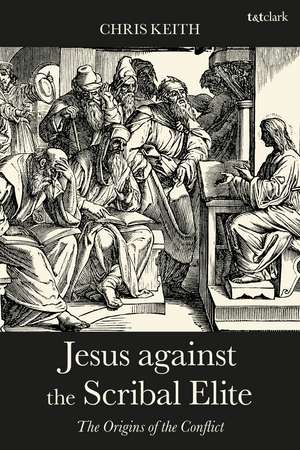Jesus against the Scribal Elite: The Origins of the Conflict
Autor Chris Keithen Limba Engleză Paperback – 16 sep 2020
Preț: 184.21 lei
Preț vechi: 214.57 lei
-14% Nou
Puncte Express: 276
Preț estimativ în valută:
35.25€ • 36.67$ • 29.10£
35.25€ • 36.67$ • 29.10£
Carte tipărită la comandă
Livrare economică 14-28 aprilie
Preluare comenzi: 021 569.72.76
Specificații
ISBN-13: 9780567687098
ISBN-10: 0567687090
Pagini: 208
Dimensiuni: 156 x 234 x 9 mm
Greutate: 0.3 kg
Editura: Bloomsbury Publishing
Colecția T&T Clark
Locul publicării:London, United Kingdom
ISBN-10: 0567687090
Pagini: 208
Dimensiuni: 156 x 234 x 9 mm
Greutate: 0.3 kg
Editura: Bloomsbury Publishing
Colecția T&T Clark
Locul publicării:London, United Kingdom
Caracteristici
Questions the level of Jesus' own literacy and how this may have affected his interactions with a scribal elitist culture
Notă biografică
Chris Keith is Professor of New Testament and Early Christianity and Directory of the Centre for the Social-Scientific Study of the Bible at St. Mary's University Twickenham, UK.
Cuprins
Preface Abbreviations Introduction 1.Teachers in the Time of Jesus2.Jesus as Teacher in the Gospels3.Assessing the Texts 4.Jesus and Scribal Literacy 5.The Content of the Conflict 6. The Emergence of the Conflict: Concluding Remarks Bibliography Scripture and Ancient Writings Index Author Index Subject Index
Recenzii
Keith's investigation is informative, readable and engaging. ... Recommended!
Professor Keith's book commendably combines comprehensiveness with concision: in less than two hundred pages, he covers literacy in Jesus' time, Jesus' own literacy and an overview of historical Jesus studies, all to bolster his argument about the origins of the conflict between Jesus and the scribal elites. It is an excellent, insightful and thorough work of scholarship, on which the author is to be congratulated.
In this updated version of his instant classic, Chris Keith, one of the foremost and most exciting New Testament scholars working today, creatively weaves together piercing historical analysis, sensitive social analysis, and insights from the broader ancient world to answer the question 'how literate was Jesus?' Though informed by rigorous scholarship, this important book is accessible to and indispensable for anyone who wants to know more about Jesus, his preaching, and the circumstances that led to his death.
In this book, as lucid and accessible as it is compelling, Chris Keith exposes the issues that lay at the very heart of Jesus's engagement with the scribal elite. This is written for upper-level students, but scholars too will find much to consider in this excellent treatment.
This well-written study by Chris Keith puts Jesus as a public teacher into new light. The attention this book devotes to Jesus in relation to the social context of his day not only challenges assumptions about what it means for Jesus to be God's Messiah and Son of God but also offers a fresh way to understand what it meant for Jesus to have given instructions at all and to have debated them with his Jewish contemporaries. Readers with any interest in the historical Jesus will have a hard time putting the book down.
Chris Keith is one of the leading scholars of literacy in Christian antiquity, especially as it relates to the historical Jesus. In this new contribution, he makes his views accessible to the nonspecialist who is interested in knowing, was Jesus a well-educated teacher who could read and write? And if not, why did he fall afoul of the powerful scribes-the readers, writers, and teachers of his world-leading to his demise? Clearly written and coherently argued, this will be a book for scholar and layperson alike.
Professor Keith's book commendably combines comprehensiveness with concision: in less than two hundred pages, he covers literacy in Jesus' time, Jesus' own literacy and an overview of historical Jesus studies, all to bolster his argument about the origins of the conflict between Jesus and the scribal elites. It is an excellent, insightful and thorough work of scholarship, on which the author is to be congratulated.
In this updated version of his instant classic, Chris Keith, one of the foremost and most exciting New Testament scholars working today, creatively weaves together piercing historical analysis, sensitive social analysis, and insights from the broader ancient world to answer the question 'how literate was Jesus?' Though informed by rigorous scholarship, this important book is accessible to and indispensable for anyone who wants to know more about Jesus, his preaching, and the circumstances that led to his death.
In this book, as lucid and accessible as it is compelling, Chris Keith exposes the issues that lay at the very heart of Jesus's engagement with the scribal elite. This is written for upper-level students, but scholars too will find much to consider in this excellent treatment.
This well-written study by Chris Keith puts Jesus as a public teacher into new light. The attention this book devotes to Jesus in relation to the social context of his day not only challenges assumptions about what it means for Jesus to be God's Messiah and Son of God but also offers a fresh way to understand what it meant for Jesus to have given instructions at all and to have debated them with his Jewish contemporaries. Readers with any interest in the historical Jesus will have a hard time putting the book down.
Chris Keith is one of the leading scholars of literacy in Christian antiquity, especially as it relates to the historical Jesus. In this new contribution, he makes his views accessible to the nonspecialist who is interested in knowing, was Jesus a well-educated teacher who could read and write? And if not, why did he fall afoul of the powerful scribes-the readers, writers, and teachers of his world-leading to his demise? Clearly written and coherently argued, this will be a book for scholar and layperson alike.
